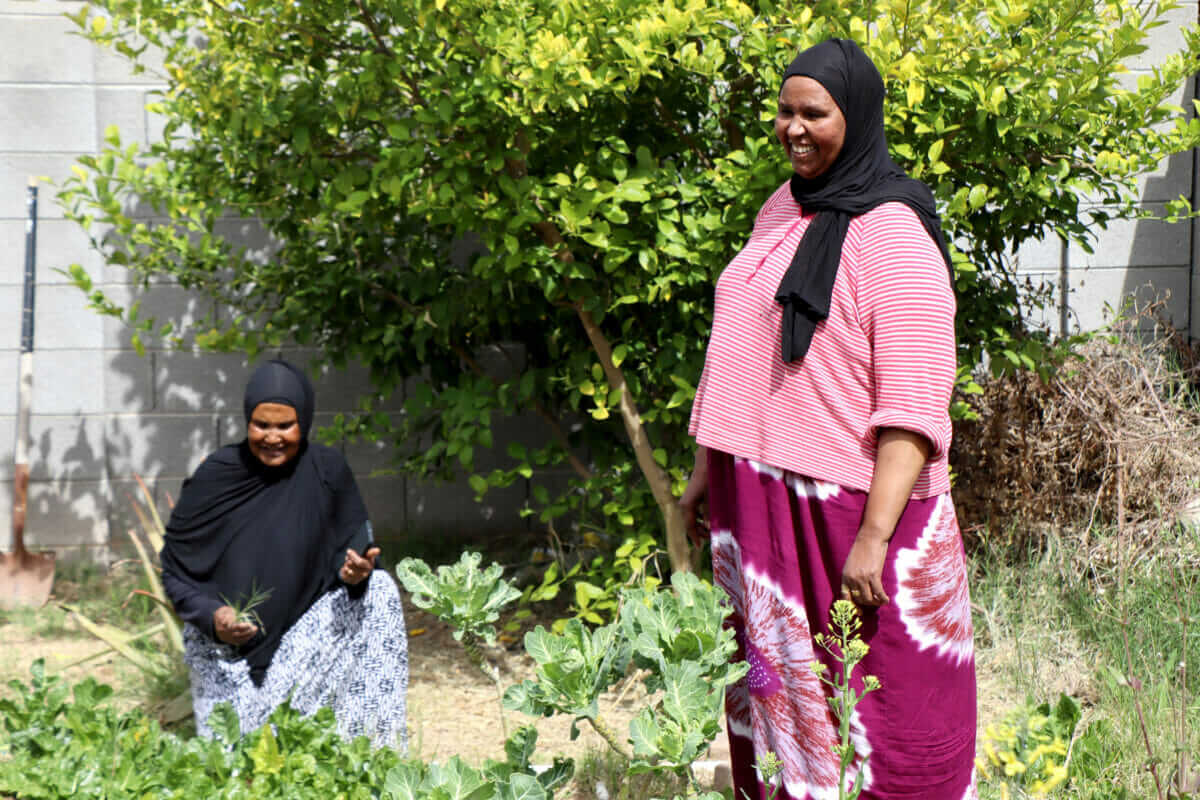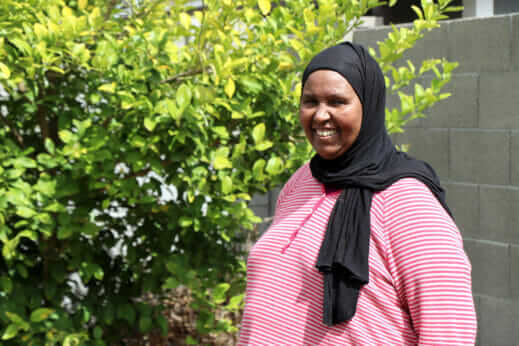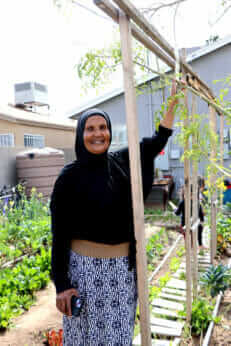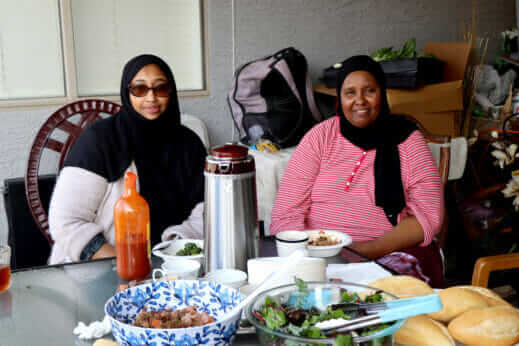Meet the Refugee Homesteaders Cultivating Backyards for Food Justice
Drinking Gourd Farms helps people start their own homesteads and experience food freedom.
Meet the Refugee Homesteaders Cultivating Backyards for Food Justice
Drinking Gourd Farms helps people start their own homesteads and experience food freedom.

Kadija Farah (left) and Ibado Mahmud (right) are Somali refugees who grow food as part of the Drinking Gourd Farms collective. by Callie Radke Stevens.
Ibado Mahmud lives in a typical house in an Arizona development, and from the front, any visitor might be mistaken for thinking it is just that: typical. But Mahmud’s ordinary home hides an abundant homestead garden stretching from the house all the way to the brick wall marking the edge of the property. It is one of the many homestead gardens that make up Drinking Gourd Farms.
Mahmud helped start the Phoenix-based collective in 2019 with a mission to grow both food and justice. Her house is one of seven or eight mainstay gardens—since teaching people to grow their own food is also part of the mission, the exact number varies. Mahmud estimates the collective has helped start 20 to 30 gardens around the city. “I think it’s good that people have that knowledge—to grow their own food,” she says.

Kadija Farah has a garden, too, although it looks a little different than Mahmud’s. Farah’s garden has turned her small condo terrace into an Eden, spilling out of containers and a small strip of earth. In the garden, “I feel relief,” Farah says. “It’s good. It encourages me what I can learn.”
Any food from Drinking Gourd that the hosts and volunteers don’t eat themselves is harvested and distributed to families who lack the money or time to grow their own healthy produce. At the height of the pandemic, they were distributing food to around 165 families each week (supplementing their year-two produce with food bought with stimulus checks). Now, the number is closer to 25 each week. Some of the backyard owners donate or exchange garden space, allowing people who live in apartments to come and grow food, too.
The collective focuses on marginalized communities and upholds a vision of Black food sovereignty, although Mahmud says that it would help anyone who was in need and teach anyone who wanted to learn.
“It’s important to grow food, no matter who you are,” she says. “Let’s go back to our ancestors and create our own food.”

Mahmud herself knows something about the importance of a collective that shares food, gardening opportunities and community. She and Farah both came to the United States as refugees from Somalia in 1993. There wasn’t much of a support system; she had young children, and she didn’t speak the language well. A resettlement agency provided some food, but she didn’t know how to make sure something was pork-free to maintain her religious dietary convictions. It was a difficult time. Now, she hopes Drinking Gourd can provide the community she didn’t have 30 years ago.
The garden has seen plenty of trial and error. While Mahmud’s father farmed during her childhood, she and the other gardeners were starting from scratch when it came to farming in the urban soil of Arizona. The first year was all new, and Mahmud says that now, in year four, she and the onsite manager are still learning from other farms and gardens and from their own experience.
“We’ve put a lot of time, a lot of labor into the soil,” says Mahmud. “You will know what is right and what is not when you get to do it.”

Mahmud and others involved with Drinking Gourd dream of some day buying a farm-size parcel of land where they could grow all the food they need. Mahmud also has a vision of providing work and community for those coming out of incarceration, creating a farm that is a safe space for people to reintegrate. Already, as food prices rise, the gardens can’t always meet demand. And while Drinking Gourd maintains a small staff, they had to go several months without pay when the collective ran out of funding last year. “We’re just praying that we can do more,” she says.
Standing in the backyard garden, Mahmud points to the rows of greens; these are the things she grows that remind her of home. The garden, the collective and the mission help remind her who she is, she says.
“My father used to tell me, ‘When you are somewhere new, show them who you are,’” says Mahmud. By growing food, sharing it and teaching others to do the same, she is doing just that.
Follow us

This work is licensed under a Creative Commons Attribution-NoDerivatives 4.0 International License.
Want to republish a Modern Farmer story?
We are happy for Modern Farmer stories to be shared, and encourage you to republish our articles for your audience. When doing so, we ask that you follow these guidelines:
Please credit us and our writers
For the author byline, please use “Author Name, Modern Farmer.” At the top of our stories, if on the web, please include this text and link: “This story was originally published by Modern Farmer.”
Please make sure to include a link back to either our home page or the article URL.
At the bottom of the story, please include the following text:
“Modern Farmer is a nonprofit initiative dedicated to raising awareness and catalyzing action at the intersection of food, agriculture, and society. Read more at <link>Modern Farmer</link>.”
Use our widget
We’d like to be able to track our stories, so we ask that if you republish our content, you do so using our widget (located on the left hand side of the article). The HTML code has a built-in tracker that tells us the data and domain where the story was published, as well as view counts.
Check the image requirements
It’s your responsibility to confirm you're licensed to republish images in our articles. Some images, such as those from commercial providers, don't allow their images to be republished without permission or payment. Copyright terms are generally listed in the image caption and attribution. You are welcome to omit our images or substitute with your own. Charts and interactive graphics follow the same rules.
Don’t change too much. Or, ask us first.
Articles must be republished in their entirety. It’s okay to change references to time (“today” to “yesterday”) or location (“Iowa City, IA” to “here”). But please keep everything else the same.
If you feel strongly that a more material edit needs to be made, get in touch with us at [email protected]. We’re happy to discuss it with the original author, but we must have prior approval for changes before publication.
Special cases
Extracts. You may run the first few lines or paragraphs of the article and then say: “Read the full article at Modern Farmer” with a link back to the original article.
Quotes. You may quote authors provided you include a link back to the article URL.
Translations. These require writer approval. To inquire about translation of a Modern Farmer article, contact us at [email protected]
Signed consent / copyright release forms. These are not required, provided you are following these guidelines.
Print. Articles can be republished in print under these same rules, with the exception that you do not need to include the links.
Tag us
When sharing the story on social media, please tag us using the following: - Twitter (@ModFarm) - Facebook (@ModernFarmerMedia) - Instagram (@modfarm)
Use our content respectfully
Modern Farmer is a nonprofit and as such we share our content for free and in good faith in order to reach new audiences. Respectfully,
No selling ads against our stories. It’s okay to put our stories on pages with ads.
Don’t republish our material wholesale, or automatically; you need to select stories to be republished individually.
You have no rights to sell, license, syndicate, or otherwise represent yourself as the authorized owner of our material to any third parties. This means that you cannot actively publish or submit our work for syndication to third party platforms or apps like Apple News or Google News. We understand that publishers cannot fully control when certain third parties automatically summarize or crawl content from publishers’ own sites.
Keep in touch
We want to hear from you if you love Modern Farmer content, have a collaboration idea, or anything else to share. As a nonprofit outlet, we work in service of our community and are always open to comments, feedback, and ideas. Contact us at [email protected].by Callie Radke Stevens, Modern Farmer
April 13, 2023
Modern Farmer Weekly
Solutions Hub
Innovations, ideas and inspiration. Actionable solutions for a resilient food system.
ExploreExplore other topics
Share With Us
We want to hear from Modern Farmer readers who have thoughtful commentary, actionable solutions, or helpful ideas to share.
SubmitNecessary cookies are absolutely essential for the website to function properly. This category only includes cookies that ensures basic functionalities and security features of the website. These cookies do not store any personal information.
Any cookies that may not be particularly necessary for the website to function and are used specifically to collect user personal data via analytics, ads, other embedded contents are termed as non-necessary cookies.
Inspiring story , hopefully others will follow this exceptional example.
This is wonderful!
Wonderful article. I hope they are able to build that dream farm and help others